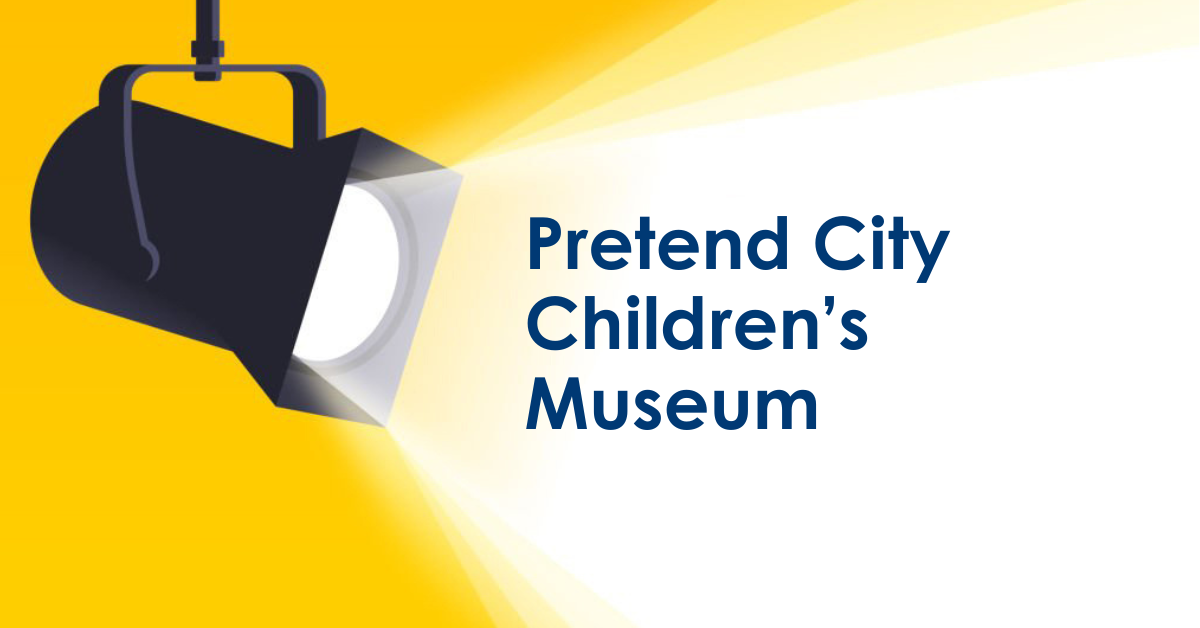EVALCORP recently completed an evaluation capacity building project with Pretend City Children’s Museum. Pretend City is an innovative museum that features a child-size city with interactive exhibits that help children learn about how the world works by engaging their curiosities and imaginations through play. The museum fosters learning in a fun, welcoming, and creative environment. Additionally, Pretend City gives back to the community by offering things like developmental health screenings, Neurodivergent Family Nights, and free and reduced cost field trips to the museum. EVALCORP was honored to partner with Pretend City to support their evaluation efforts to measure and communicate the great impacts that they are making in their guests and the greater community.
EVALCORP begun collaborating with Pretend City in 2022 to support them as they built an internal culture that recognized the importance of evaluation and developed their capacity to conduct evaluation to enhance their impact in the community. The entire project was a collaborative effort between EVC and Pretend City, and it couldn’t have been successful without the participation, engagement, and talents of the museum staff.
After we worked with the museum to put together their own evaluation team, we took them through a series of advanced workshops to design an evaluation project. Workshop content included developing evaluation questions, developing data collection tools and processes, analyzing the data, and sharing findings with the entire museum staff. After presenting findings to staff, the Pretend City evaluation team shared what they learned and what they would do differently for their next evaluation project. It was a moment where they recognized both what they had done well and what they could do to improve based on all the foundations that they had learned. This was also the moment when we knew our goal of building evaluation capacity at Pretend City had been achieved.
Our team was most proud of the way we tailored the project to the museum’s needs to make a truly collaborative process between our team and Pretend City. For example, we provided examples that spoke about specific exhibits at the museum and reiterated evaluation questions that staff had expressed curiosity about throughout our training. This was possible because we opened up the room at each training to hear from the staff instead of just providing content. We wanted to make sure the process was collaborative so that the staff could have a sense of ownership in the evaluation capacity building process. Also, we continued to adjust our training plan based on what the staff expressed they needed. For example, if we heard in feedback surveys that they wanted to spend more time learning about the data feedback loop, we made sure to include it in the next training and also provided take-home material. We kept our eyes on the feedback from the team at Pretend City so that we could adjust our efforts to best serve their needs.
One thing that this project emphasized for us as a consulting business, is that evaluation capacity building training has to be tailored to the specific needs, culture, and environment of the agency we are working with. If the examples or content that we deliver don’t resonate with the staff we are training, the agency will not be engaged. In order to demonstrate how evaluation can serve their needs and improve the work that they are doing, we have to spend time learning about the agency to figure out what their biggest needs or curiosities are so that we can demonstrate how evaluation can answer those questions for them. Another important thing that we learned is to let those who we’ve trained be the trainer for their organization. To ensure that a culture of evaluation is sustained after our trainings are over, we have to make sure our trainees are at a place where they can also train other groups at their agency and continue their evaluation efforts/education. This also means that we leave them with training materials, planning templates, and guides to utilize for future evaluations. For example, in our advanced workshops, we focused on building facilitation guides and templates that can be re-used when they go through the process of developing evaluation questions and data collection tools on their own.
We concluded the project feeling confident in Pretend City’s renewed capacity for evaluation and are excited to see how Pretend City continues to make an impact through data-informed decision-making. It was an honor to work with the folks at Pretend City!

